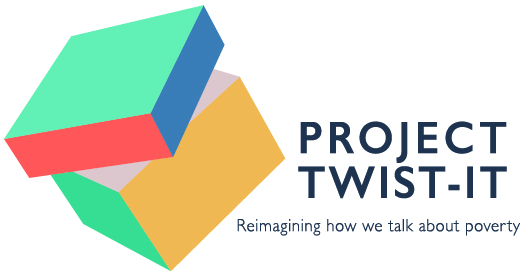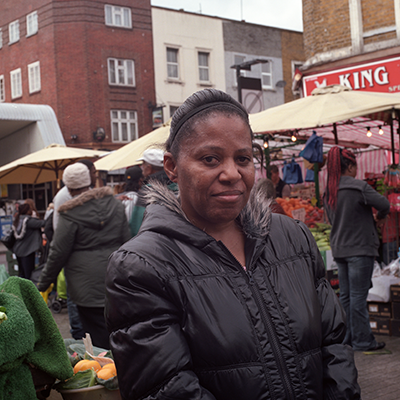ATD Fourth World UK
All Together in Dignity / ATD Fourth World is a human rights based anti-poverty organisation, with more than 50 years’ experience tackling inequality and promoting social justice in the UK.
The Roles We Play:
recognising the contributions of people in poverty
All photographs from the project are by Eva Sajovic – www.evasajovic.co.uk
See more at https://therolesweplay.co.uk/
These four voices from ATD Fourth World UK people were among 26 people in poverty who co-created the 2009–2019 project: ‘The Roles We Play: Recognising the Contributions of People in Poverty’.
The project provided a forum for people with experience of poverty to challenge the widespread negative stereotypes of their lives through the use of positive imagery and self-representation.
The project evolved over 10 years and took a number of forms: a photo exhibition, a series of workshops around public speaking, a full-colour book, a multimedia exhibition and a film about the steps that enabled project participants to dialogue with the wider public on issues of poverty.
Find out more about the project and download a free PDF version of the book here – https://atd-uk.org/projects-campaigns/the-roles-we-play/
To order a hard copy of the book, please contact atd@atd-uk.org
Four voices from The Roles We Play
Angela, ambassador
Angela, Ambassador.
I am Angela, a mum of seven kids, and I live in east London. My mum was born in Venezuela but moved to London as a little girl. She worked in a school as a dinner lady who cooked and served meals. She also worked in the city cleaning office buildings. We mums have to be strong for our kids. We always focus on our kids; we put ourselves last. If we’re not strong for them, how can they ever overcome inequality?
Children and their families get trapped in poverty, and that’s the fault of the system. I want to work; but left school without the qualifications I need. And who will employ me without qualifications? I try to change this. I have done courses at a local community centre to try and get qualifications so that I can get work. But not all children have equal chances of succeeding in school.
The support that families get is unequal too. When the failings of the system are blamed on parents, all that does is undermine the family unit. You can see your child struggling year after year, but not actually receive a diagnosis of autism until he turns 17. And if you are struggling to help your children, sometimes the only response from social services is to remove the children from your custody. If that happens, it might be many years before you can see your own children again, and before they’re allowed to see their brothers and sisters.
My children have seen me struggle and I want a better future for them. More than anything, I want them to have a good education and to be able to go to college or university. I want them to make the most of the opportunities that I never had.
Amanda, Philosopher
For myself, and for two or three of us I know, poverty is about what life throws at you. You hit rock bottom, where you feel there’s no point in getting up in the morning. You might as well be six feet under. People can have their soul destroyed, but then ATD Fourth World helps them to rebuild it. It’s our saving grace. We would have gone under.
More than ten years ago, I met ATD Fourth World. It's where we can come out the other side of poverty. We come together with others in a way that makes each person feel honoured in their soul. It's our saving grace knowing that even if we screw up along the way, we can always come back and start again. Each of us has a backbone to stand up for what's right — and together, we've got strength in numbers.
I do feel like I have grown in confidence over the years. At the beginning, I would not say ‘boo to a goose'. This changed, due to support from people in ATD Fourth World including other activists with lived experience of poverty. Peer support is really important.
I do not only just represent myself. I also represent others that are in poverty who might not be ready to speak out. I learnt to give voice to other people’s struggles and suffering and also share from my own experience; but at the same time I’ve also learnt that you should only say the things that you are comfortable with. Now I feel that I can speak off the top of my head — but our work is just beginning. Now we've got to knock on doors to get people to listen to us so that they understand more about poverty and so that we can figure out tangible solutions.
Joel, Music Man
I've been on this estate forever. I was one of the kids here and I still play outside. The kids here know me and I know them. I'm hard not to miss when I'm walking around the estate; I'm very recognisable. I've lived here all my life so I think I'm a very good person to be working with them at the local after-school club.
One of the things I do is to run music workshops. I come here and teach the kids and they really enjoy it. I started bringing my guitar, then I brought hand drums and then we started beat-boxing. In fact, it all really began with beat-boxing. I was doing it once and the children were all like, "Woah, what is that?" After a while, I started to notice they were beat-boxing on their own! Now I bring a drum kit up here too.
Today I found one boy who drums naturally and I noticed one girl who plays guitar better than the others. There's another kid who can't concentrate but when he finds something he likes can be so focused.
It means a lot to me; it's something I really do enjoy.
People in poverty are discriminated against but it's not outright, it's more behind the scenes. When people know you're from a certain area, they instantly look at you differently. It's never necessarily about how you look or what you have, it's just where you're from.
Thomas, Analyst
Thomas, with his wife Tammy, who also contributed to The Roles We Play.
For three years now, I've been part of participatory research about ‘Understanding Poverty in All Its Forms’. We uncovered six dimensions of poverty during our research. One was ‘disempowering systems, structures and policies’. People spoke to us about a broken system that doesn’t meet people’s needs. Sometimes the system is even viewed as bullying or unnecessarily harsh. People felt that policy makers were very remote and that they didn’t understand people’s lives well.
Another dimension is ‘financial insecurity, financial exclusion and debt’. This means not being able to satisfy your basic needs. Worrying about money every day causes huge stress and misery. The cost of living is going up; but benefits are going down or are capped. Even with good budgeting skills, people told us how they couldn’t make ends meet and that they could be floored by an unexpected bill that needs paying with money you just don’t have. This often leads to debt, having to borrow from friends and neighbours.
We found that poverty ‘damages health and well-being’. Poverty can shorten your life. It has a negative impact on physical, emotional, mental and social well-being in many ways. Stress can lead to depression. Not being able to afford healthy meals or have the means to cook fresh food can lead to ill health and a lack of energy. Children can struggle to concentrate at school. We were shocked by how often people described traumatic experiences and by the burdens they were carrying.
‘Stigma, blame and judgement’ are also a big part of poverty. Negative judgements are deeply destructive to individuals and families. Prejudice and discrimination result in people in poverty feeling they are treated like lesser human beings. It only takes one incident of someone abusing the system for some of the press to jump on it and tarnish everyone on benefits. Too many people believe that poverty is their fault.
Find out more about the Six Dimensions of Poverty and the work of the research group at https://atd-uk.org/2019/11/16/the-six-dimensions-of-poverty-ripple-effects-cut-lives-short/











